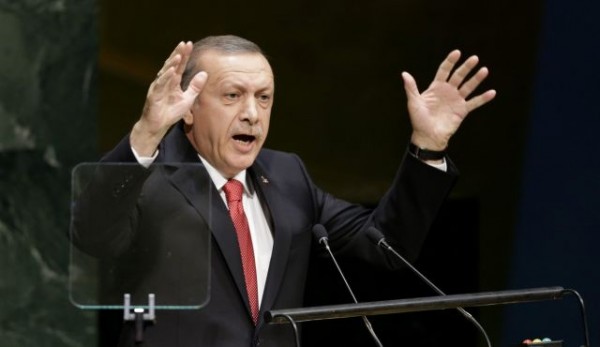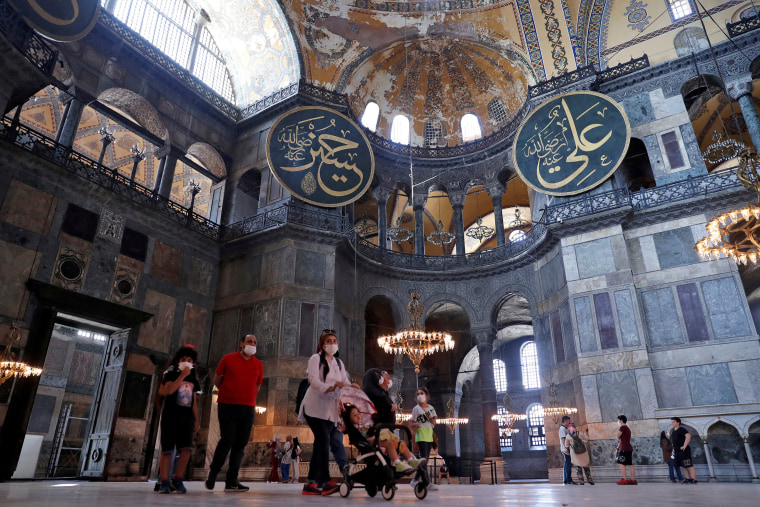By Kristina Jovanovski
ISTANBUL — The conversion of Istanbul’s symbolic, shape-shifting Hagia Sophia edifice back into a mosque is being described as a victory for the conservative religious agenda of Turkish President Recep Tayyip Erdoğan.

The Hagia Sophia was once a cathedral, and then it was a mosque. And then, in 1934, Mustafa Kemal Atatürk— the founder of modern Turkey, who aspired to build a secular state — declared it a museum.
After a Turkish court annulled Atatürk’s decision one week ago, Erdoğan swiftly declared the Hagia Sophia to be — once again — a mosque.
Analysts said the decision showed how desperate the president is to maintain his popularity among his religious and nationalist conservative base, which has kept him in power for years — but which is now seen to be waning.
Erdoğan was once celebrated for overseeing Turkey’s rapid development and booming economy. But praise has long since given way to deep concern over the country’s shaky finances and imperfect democracy, intensified by the coronavirus pandemic.
Last year, the fears led to his greatest political defeat since he came to power, as his Justice and Development Party lost control of Turkey’s two biggest cities in municipal elections.
Erdoğan now governs with the stinging public rejection of having had the voters choose the main opposition party, the Republican People’s Party, to lead both the capital, Ankara, where he lives, and Istanbul, his hometown, where he was once mayor.
The government, which is disinclined to brook criticism, has launched investigations into opposition figures, removed elected mayors and imprisoned journalists during the coronavirus pandemic while passing a bill to release tens of thousands of inmates, lest they contract COVID-19 because of crowding.
“Turkey wanted to be a member of the democratic world, but that story has ended,” said Garo Paylan, 48, a Christian Armenian who is one of the founders of Turkey’s pro-Kurdish Peoples’ Democratic Party.
Erdoğan “can’t give bread to the people, and he’s giving more radicalism to the Muslim majority,” Paylan said over the phone.
While the Hagia Sophia decision was a major symbolic win for the country’s Islamists, Paylan argued that it shut the door to the future for minorities in the country and took away a symbol of respect for the country’s diversity. He has stopped telling his fellow Armenians to stay in the country.
Last year, the U.S. Senate declared that the mass killing of Armenians by the Ottoman Empire during the early 1900s was genocide, a label Turkey strongly rejects.
In any event, minority rights were not well supported after the Ottoman Empire ended, either.
With the founding of modern Turkey, Atatürk established a nationalist approach to Turkish identity that often ran counter to the struggles for greater minority rights.
Kurds, who are almost 20 percent of the population, have found themselves at odds with both secular and Islamist nationalists, many of whom fear the country could slide into a civil war if there were to be a push for self-governance.
The calculus has driven many of Erdoğan’s nationalist policies, but, analysts say, so have the threats to his power from the Peoples’ Democratic Party.
In 2015, the party entered the Grand National Assembly, Turkey’s parliament, for the first time, stopping Erdoğan’s party from getting a majority. That led him to partner with the ultranationalist Nationalist Movement Party, further cementing his need to push a conservative agenda.

Erdoğan’s supporters counter that he has increased language rights and living standards for Kurds, many of whom vote for his party.
Paylan said he will likely go to prison when he is no longer a member of parliament with immunity.
Other Peoples’ Democratic Party members are already there, accused of being connected to the Kurdistan Workers’ Party, a Turkish militant group designated a terrorist organization by Ankara and Washington.
Paylan rejected the allegation. However, it has led the government to remove his party’s members from mayoral posts they won in last year’s municipal elections.
Elmira Bayrasli, a Turkish American who is director of Bard College’s globalization and international affairs program, said the Hagia Sophia decision represented Erdoğan’s going on “the offense” in the face of increasing challenges, some of them from new splinter parties from his Justice and Development Party.
“My guess is it’s only going to get worse,” Bayrasli said. “He’s desperate to hold onto power.”
Feminist activists blame the government’s conservatism for what they say is a steady rise in gender-based violence.
The deputy chairman of the Justice and Development Party suggested this month that Turkey might exit the Istanbul Convention, a treaty to protect women from violence.
In a telephone interview, Neslihan Duran, 24, a student at Gaza University in Ankara, said that “with such policies, women are designated as an inferior gender.”
Duran helped set up a Twitter campaign to call for justice for fellow university student Şule Çet, who was raped and killed in 2018. Duran argued that the government’s promotion of conservative religious values led to Çet’s being criticized during the trial for not being a virgin.
For Yusuf Erim, 40, a Muslim Turk, Erdoğan’s conservatism is a reminder to the country’s Muslims that they are part of a larger Islamic community.
Erim, an editor-at-large for the Turkish state broadcaster, TRT, said turning the Hagia Sophia back into a mosque was another way to do that. He said he believed Muslims around the world would flock to pray at the historic building.
“Let’s call it an Islamic bucket list,” he said over the phone.
The almost 1,500-year-old monument is significant both for Christians, because it was built as a cathedral during the Byzantine Empire, and Muslims, because it was converted into a mosque after the Ottoman Turks conquered Istanbul in 1453.
Erim said that under Erdoğan, Turkey has been transformed into a regional power because of its major infrastructure projects and military campaigns.
“How can you not be proud?” he asked. “I can say, ‘Wow, my country has come a long way.’”
Others were less excited about the Hagia Sophia’s being converted into a mosque. The U.S. State Department said it was “disappointed.”
Asked for comment, the Turkish government pointed to Erdoğan’s speech last week in which he said the building would be open to “locals and foreigners, Muslims and non-Muslims.”
Paylan, the member of parliament with the Peoples’ Democratic Party, feared that the decision would lead to a backlash against Muslims while Christians in Turkey have a sacred symbol of their history taken away.
“This is going to make the tension bigger between the Muslims and the Christians,” he said.
NBC

Leave a Reply
You must be logged in to post a comment.